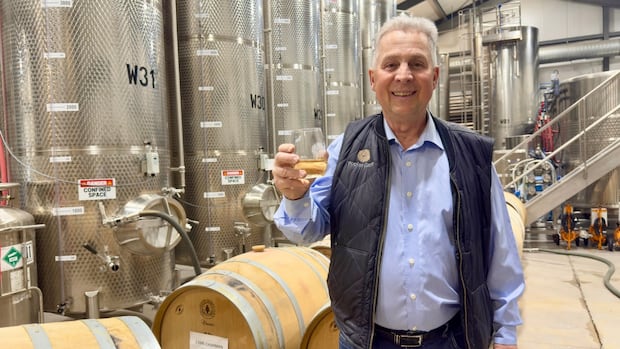Canada’s united boycott of U.S. booze could result in a banner year for British Columbia’s wine industry, while also delivering a financial blow to vineyards south of the border.
The Buy Canadian movement is expected to boost demand for B.C. wine and some other types of homegrown liquor as the absence of U.S. product means more space at retail stores and on restaurant menus. The amount of visitors to vineyards could also rise as many Canadians steer clear of the U.S. this summer.
It’s a sharp change of fortune for B.C. wineries after two years of dismal crops, including a cold snap in early 2024 that wiped out nearly all of the grapes.
The summer tourism season has yet to begin, but there are early signs of both increased visitors and sales at Poplar Grove Winery in Penticton, B.C.

“I’m excited, first of all, and very, very optimistic,” said co-owner Tony Holler, in an interview with CBC News, as he walked through the rows of vines as part of the 65-hectare operation.
“Everything looks really, really good here in the Okanagan.”
He notes that this summer is a unique opportunity for winemakers in the province because of the increased demand and exposure for their product.
“A lot of people who’ve never tasted our wine, once they taste them, I’m telling you, they’re going to keep buying them,” said Holler.
Canadian provinces began removing U.S. liquor from store shelves in early March in response to U.S. President Donald Trump’s trade policy, which experts say could hurt Canada’s economy and lead to job losses.

Buy Canadian movement opening doors
Trump has made a number of remarks about making Canada the 51st state and introduced a 25 per cent tariff on the importing of Canadian goods, although some exemptions have since been made.
Several provinces are looking to boost interprovincial trade in the face of looming U.S. tariffs, which could lead to more B.C. wines on store shelves across the country.
Since B.C. struck a direct-to-consumer wine sale program with Alberta in early January, over 43,200 bottles have been sold from 89 B.C. wineries, according to B.C. cabinet minister Garry Begg.
“A lot of consumer sentiment certainly seems to be shifting and saying ‘I don’t want U.S. wines.’ So I think it opens up a lot of doors for the Canadian wine industry,” said Paul Sawler, the board chair of Wine Growers British Columbia.
Large restaurant chains are requesting more product, said Sawler, who also works as director of sales at Dirty Laundry Vineyards in Summerland, B.C. So far, he says, visitors to the vineyard are up 40 per cent compared to last year.

Tough blow for U.S. winemakers
South of the border, it’s a distressing situation as Canada is the largest export market for the U.S. wine industry, with a retail value of about $1.1 billion US annually.
“It has been a big impact to our business,” said Joan Kautz, head of global sales at Ironstone Vineyard, a 2,500-hectare site in Lodi, Calif.
According to Kautz, Canada represents about 20 per cent of the vineyard’s exports and about 10 per cent of its overall sales. Since early March, she says orders have been cancelled and many of its bottles are stuck in warehouses in Ontario, Quebec and several other provinces.
“It’s frustrating. We’d love to have it back out on the shelves,” said Kautz.
“Canada is a very important market to us in all aspects. We’ve spent the last 30 years building the market and we have tremendous partners in the market who are very supportive of us. And we all just want to get back to business.”
The timing couldn’t be worse for the U.S. industry, which insiders say is already suffering from decreasing sales post-pandemic and a slowdown in visits to some wineries.

Even after the Canadian boycott is eventually resolved, some U.S. industry leaders are concerned about the long-term impact because of the psychological damage to the consumer.
Kautz can only wait and hope the dispute is cleared up soon.
“I mean, we’re neighbours and partners,” she said. “Over time, people will come back to California wines because the quality is fantastic.”
In B.C., producers have said the wineries with the worst damage from the extreme cold in 2024 may need at least three years for their crop to fully recover.
Last year, many wineries, including Poplar Grove, imported grapes from Washington state in order to maintain their operations. This temporary adjustment resulted in the production of varieties that were labelled “crafted in B.C.” in the interest of transparency.
Holler expects Poplar Grove will grow enough grapes this year to avoid needing to import any fruit.
“Our gut feeling is that we should have two-thirds of a crop, and then probably next year we get a bit bigger crop and the following year back to a full crop,” he said.
“Wineries have wine. Nobody’s run out of wine.”

